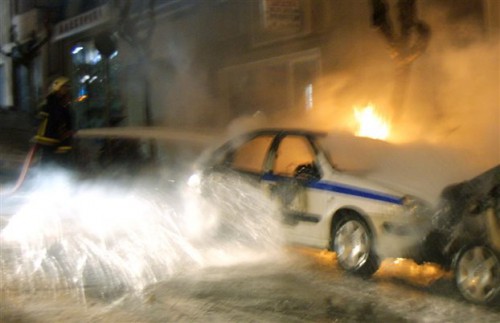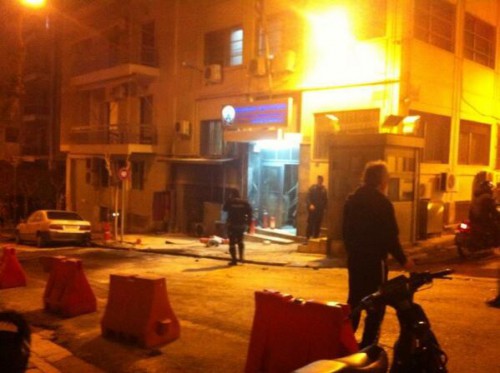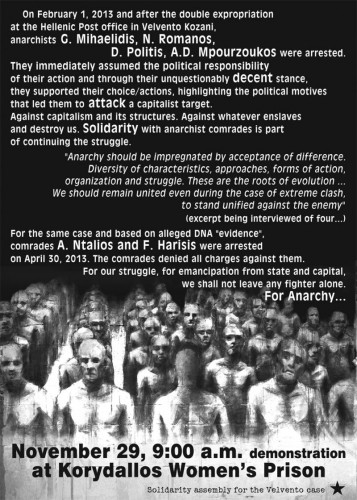via opendemocracy
Five years ago, 15-year-old Alexandros Grigoropoulos was shot dead by police in Athens. His death sparked huge riots and sent shockwaves across Europe. What has been learned?
 The spot where Alexandros Grigoropoulos was killed. Wikimedia commons/Badseed. Some rights reserved.
The spot where Alexandros Grigoropoulos was killed. Wikimedia commons/Badseed. Some rights reserved.
Five years ago today, Alexandros Grigoropoulos, a 15-year-old student, was shot dead by a police officer in the Exarcheia district of central Athens. The incident sparked large demonstrations across the country, resulting in widespread rioting that lasted almost a month.
Thousands of protesters – especially the young generation – were publicly expressing their frustration against police impunity, corruption and rising unemployment. Five years after the rebellion, the European systemic political forces still attempt to erase these events from the public memory, describing it as a nightmare that must never be repeated.
But what is the real meaning of the December rebellion for us today? This question I will try to address here aiming not only to challenge the dominant reactionary claim that the December riots were nothing but “acts of war” – as the far-right leader (of LAOS) Giorgos Karatzaferis has said (Filippidis 2011, p.63) – but additionally to elucidate on the spirit of self-organization that emerged during those days, the authentic and deeper message of this historical moment.
Connections with the past
The socio-political significance of the December rebellion cannot be understood without acknowledging the spirit of resistance and disobedience that emerged during the Athens Polytechnic uprising of 1973. This was the culmination of the struggle against the military junta which had ruled Greece since 1967. The most notable characteristic of the Polytechnic uprising was the direct involvement of the people in the pursuit of freedom. The occupation of the Polytechnic School by a handful of students was not controlled or guided by any party, bureaucracy or representative, just as the December insurrection was not directed by any political organisation nor motivated by a single ideology.
The Polytechnic uprising utilized the best substance of human beings as political animals: solidarity, friendship, selflessness, imagination and passion for creation (Oikonomou 2013, p.30). The dynamics and function of the occupation were based on the principles of self-organization and self-management, highlighting some key points for reflection and future political actions and the root causes for the spark of the anti-dictatorial Student Movement (Oikonomou 2013, p.31).
These elements, together with the rejection of oppression and state authoritarianism, continued during the era of metapolitefsi, and re-appeared again in the days of December. This is the particular significance of the rebellion, which became entirely ignored by the major mainstream European media whose response was a sterile condemnation of violence, describing the events as a generalized outbreak of juvenile delinquency or the rule of the howling mob against common sense.
The media
The stance of the conservative press and a large number of journalists regarding the rebellion was rather superficial. Zero effort was made on their behalf to explain the event not according to penal terms but based on political and social elucidation, whilst the overall situation that led to the uprising has been attributed to a cultural anomaly of lawlessness supposedly rooted in Greek society.
These simplistic claims, that the December revolt was nothing but a series of widespread vandalism caused by the rule of angry mobs and ‘parasite’ fringe groups is utterly unacceptable, as it obscures a fundamental truth; the majority of protesters did not invest in violence for violence’s sake.
Whilst the mob “hates society from which it is excluded” (Arendt 1976, p.107) striving for extraparliamentary action (Arendt 1976, p.108), during the December riots, the majority of the protesters that attacked government buildings and big corporation-stores (let alone the majority who instead of damaging police vans became engaged in collective political action, setting up public assemblies) were ordinary men and women, integral parts of the Greek society – that is poisoned by the dream of personal success -, on which they had put all their efforts, conforming with its ideals and big promises, but instead received nothing in return.
It is undeniable that during the December riots there were a significant amount of declases who organized looting and destruction of small shops. However, this not only does not negate the overwhelming indignation against a crony establishment, neither can it whitewash the rejection of egocentrism (such as the actual loss of social relationships) and the logic of social control that for many years was forced upon the young Greeks. In regards to this, we see that the rioters instead of proposing destruction of their society (which is what the mobs crave for) fought for more society, for more togetherness and solidarity.
The public realm
As during the Polytechnic uprising, self-organization, togetherness and friendship replaced terror, state propaganda and mistrust, similarly during the December revolt we could see neighbourhood assemblies along with the occupations of schools, universities, municipal offices and theaters taking place and a widespread rejection of apathy, cynicism, the tyranny of financial uncertainty and political indifference.
Historically speaking, such open public assemblies, namely political bodies operating horizontally and allowing key decisions to be taken through procedures of direct democracy spontaneously appeared “in every genuine revolution throughout the nineteenth and twentieth centuries” (Arendt 1990, p.249); from the Parisian Commune to the Hungarian Revolution of 1956 where councils of students, writers, workers and artists, also councils in the army or among the civil servants appeared in every district of Budapest (Arendt 1990, p.266-267).
This is the so called public (or political) realm, the self-governed body of active citizens which allows them collectively to take upon themselves the running of their society/community, the common world that embodies the fully human condition of political consultation and communication, ruled by friendship, reason and plurality (Arendt 1998) and, simultaneously “combines both attitudes in the ability to symbolize verbally and generalize logically” (Bookchin 1992, p.37). And we see again a public realm emerging during the Greek rebellion in the occupied universities that spread throughout union-halls and small villages (Boukalas 2011, p.323).
This is the actual political substance of December events – non-violence rather than blind aggression – what many outside observers who became exclusively focused on the fires and flames have missed. When a public realm emerges as a result of a purposeful collective action, the fundamental means of engagement for all participants is reason and equality; “for man, to the extent that he is a political being, is endowed with the power of speech instead” (Arendt 1990, p. 19) whilst brute force and sheer violence – which are by nature mute – appear as marginal phenomena in the political realm (Arendt 1998, p.26; 1990, p.19).
In fact, during the revolt, all forms of violence, including property destruction and clashes with the police happened outside this realm. As Filipidis (2011, p.61) stresses, “during these days we witnessed an unprecedented operation to exclude these phenomena of urban violence from the political sphere of the metropolis”
Finally…
The revolt “was not the answer but the question” (as the notorious slogan written on a wall says), a question on puritanical mores, such as the work ethic (more specifically, on the philistinism of labour and the deprivation of stimulating work), hierarchical obedience and the nationalistic narcissism, and simultaneously, the awakening of the fully human spirit of openness, solidarity, joyfulness, companionship seen through big demonstrations ending up in street dance or outdoors theatrical performances, music concerts or film screenings and documentaries in the squares.
As Kouki (2011 p.169) puts it, “by living an egalitarian moment [...] we were transformed from invisible solitary figures rambling around in our urban misery into political subjects who managed to challenge […] the situation itself”. Undeniably, it is not easy for the north European societies which blindly follow the Protestant dream of work-for-everything/ask-for-nothing, to conceive the political significance of December events, to despise their institutionalized norms and embrace the logic of community, friendship and direct engagement in public life, where worldliness and plurality enhance freedom and humanity, beyond the walls of the private sphere, of the pre-political realm that has taken over every human incentive, resulting to uniformity and excessive antagonism. This is the real challenge of contemporary Europe, to uphold the possibility of re-determining what should be regarded as moral and fair.
References:
Οικονόμου, Γ., 2013. Πολυτεχνείο 1973. Νισήδες: Αθήνα [Oikonomoy, G., Politexneio 1973. Nisides: Athens]
Arendt, H., 1976. The Origins of Totalitarianism. 6th ed. USA: A Harvest Book.
Arendt, H., 1990. On Revolution. 6Th ed. London: Penguin Books.
Arendt, H., and Canovan, M., 1998. The Human Condition. 2Nd ed. Chicago: The University of Chicago Press.
Bookchin, M., 1992. Urbanization without cities: The rise and decline of citizenship. Montréal: Black Rose.
Vradis, A., Dalakoglou, D., The Children of The Gallery, Metropolitan Sirens, Boukalas, Ch., Kouki, H., and Filipidis Ch., 2011. Revolt and Crisis in Greece. Edinburgh: AK Press.




 The spot where Alexandros Grigoropoulos was killed. Wikimedia commons/Badseed. Some rights reserved.
The spot where Alexandros Grigoropoulos was killed. Wikimedia commons/Badseed. Some rights reserved.

